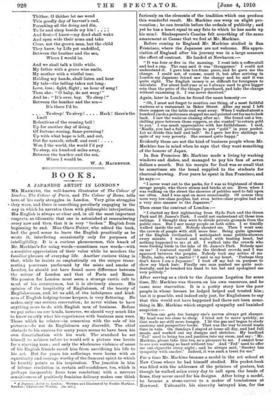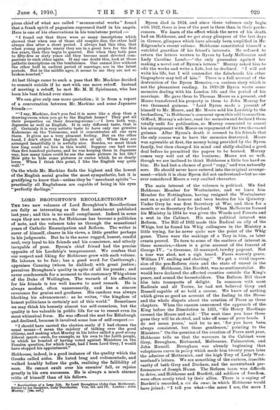BOOKS.
A JAPANESE ARTIST IN LONDON.*
• A "gespaness Artist in London. Written and Illustrated by Yoshio Markino. London: Chatto anu Windus. [6s. wt.] ME. MARINO, the well-known illustrator of The Colour of London, The Colour of Paris, and The Colour of Rome, tells • here of his early struggles in London. Very grim struggles .b they were, and there is something peculiarly engaging in the
way in which he narrates them with philosophic interjections.
His English is always so clear and, in all the most important
• respects, so idiomatic that one is astonished at remembering every new and then that it is very " broken" English from beginning to end. Miss Olave Potter, who edited the book, had the good sense to leave the English practically as he wrote -it, interfering occasionally only for purposes of intelligibility. It is a curious phenomenon, this knack of Mr, Markino's for using words—sometimes rare words—with -a sensitive appreciation of their value while he murders the familiar phrases of everyday life. Another curious thing is that, while he insists so emphatically on the unique trans- muting processes performed by the mists and smoke of London, he should not have found more difference between the colour of London and that of Paris and Rome. His passion for London must seem a strange exotic cult to most of his countrymen, but it is obviously sincere. His opinion of the hospitality of Englishmen, of the beauty of Englishwomen, and, let us add, of the indulgence and kind- ness of English lodging-house keepers, is very flattering. He makes only one serious reservation; he never wishes to have anything more to do with English men of business. Before we put ashes on out• heads, however, we should very much like -to know exactly what his experiences with business men were. Those which he relates—in connexion with the sale of his pictures—do not do Englishmen any discredit. The chief obstacle to his success for many years seems to have been his own dissatisfaction with his work. The standard he set himself to achieve before 1,e would sell a picture was heroic for a starving man; and only the wholesome violence of some of his English friends saved him from sacrificing his life to his art. But for years his sufferings were borne with an equanimity and courage worthy of the Samurai spirit to which he humbly points as his inspiration. The junction in him of intense resolution (a certain self-confidence, too, which is perhaps inseparable from true resolution) with a nervous sen4tivenessof positively feminine delicacy makes one think
furiously on the elements of the tradition which can produce this wonderful result. Mr. Markin can weep on slight pro• vocation ; he can tremble before the ordeals of publicity ; and yet he has a heart equal to any fate to which he has made up his mind. Shakespeare's Cassius felt something of the same amazement at Caesar that we feel at Mr. Marking).
Before coming to England Mr. Markino studied in San Francisco, where the Japanese are not welcome. His appre- ciation of England after his journey was in a large measure the effect of contrast. He landed at Newhaven:—
" It was four or five in the morning. I went into a coffee-stall and had a cup. The man said it was thruppence.' I could not understand it. I gave him ten-franc piece, and he gave me the change. I could not, of course, count it, but after arriving in London my Japanese friend saw the change and he said it was quite right. The English money is so difficult for foreigners to calculate. For about half-year or so I always used to give bigger coin than the price of the things I purchased, and take the change without examining it. I was never deceived."
Again, later in London he found the same honesty :— " Oh, I must not forget to mention one thing, of a most faithful waitress at a restaurant in Baker Street. After my meal I left three coppers on the table and went away. When I walked about a hundred yards a policeman stopped me and pointed out for me to look back. I saw the waitress chasing after me. She found out a ten- shilling piece between those coppers, so she wanted' to return gold to you.' I was much appreciative with her faithfulness. I said, 'Really, you had a full privilege to put "gold" in your pocket. Let us divide this half and hall.' So I gave her five shillings in spite of my very poverty. She seemed quite happy."
Evidently these are not the kind of business people whom Mr. Markin() has in mind when he says that they want something of the honour of Japan.
In San Francisco Mr. Markino made a living by washing windows and dishes, and managed to pay his fees of seven dollars a month. But his margin for food was so small that he sometimes ate the bread supplied to the students for charcoal-drawing. Four years he spent in San Francisco, and he says " I never went out to the parks, for I was so frightened of those savage people, who threw stones and bricks at me. Even when I was walking on the street the showers of pebbles used to fall upon me often. And I was spat on more occasionally. Of course they were very low-class peoples, but even better-class peoples had not a very nice manner to the Japanese."
Then came the contrast of London :—
" I started my first sightseeing from Hyde Park and the Green Park and St. James's Park. I could not understand all those iron railings. I thought they were to divide private grounds from the public ones. But I saw many people on both sides. I so timidly walked inside the rail. Nobody shouted me. Then I went neat the crowds of people with still more fear. Being quite ignorant of the English civilisation I anticipated some pebble-showers every minute. I waited and waited with beating heart, but nothing happened to me at all. I walked into the crowds who were feeding birds in the lake of St. James's Park. Nobody spat on me ! I ventured myself into the thickest crowds, and I was squeezed between the peoples. Nobody took any notice of me Hallo, hallo, what's matter P' I said in my heart. Perhaps they don't know I am a Japanese.' I took off my hat on purpose to show my black hair. Finally one man pushed me quite acci- dentally, and he touched his hand to his hat and apologised me very politely."
Alter serving as a clerk to the Japanese Legation for some time, Mr. Markin() was thrown on his own resources, and he came near starvation. It is a pretty story how the poor people in whose houses be lodged helped and trusted him; but it is possible, and indeed only just, for Englishmen to say that this would not have happened had there not been some- thing in Mr. Markino which engaged sympathy and banished
suspicion :-
" When one gets too hungry one's nerves always get sharper. My head was too clear to sleep. I tried not to move quickly, as that made me still more hungry. I lit the gas and began to study anatomy and perspective books. That was the way to avoid waste time in vain. On Sundays I stayed at home all day, and had full meals, and worked out my designs and sketches. My landlord Ted' used to bring tea and pastries into my room, and say : Mr. Markino, please take this tea, as a pleasure to me. I cannot bear to see you working so hard without tea.' And 'Ted' used to offer me one cigarette every night ; and he always said, Smoker has sympathy with smoker.' Indeed, it was such a treat for me."
For a time Mr. Markino became a model in the art school at New Cross where be had himself studied. His pocket-book was filled with the addresses of the printers of posters, but though he walked miles every day to call upon the heads of firms, they never cared for his designs. After being a model, he became a stone-carver to a maker of tombstones at Norwood. 'Unhappily. his sincerity betrayed him, for the
pious chief of what are called " monumental works " found that.a frank spirit of paganism expressed itself in his angels. Here is one of his observations in his tombstone period :-
"I found out that there were so many inscriptions which showed that when one of those old couples dies, the other half always dies after a short period. I always had this idea, that when young peoples marry they are in a great love for the first few years, then they begin to quarrel. But when they both pass to fifty-five or sixty years old they become most devoted com- panions to each other again. If any one doubt this, look at those pathetic inscriptions on the tombstones. One cannot live without the other half in earliest period of marriage, nor in the latest periods. But in the middle ages, it seems to me they are not so broken-hearted."
At last things came to such a pass that Mr. Markino decided to commit suicide if be met with one more rebuff. Instead of meeting a rebuff, he met Mr. M. H. Spielman, who has been his beat friend ever since.
We can give only one more quotation; it is from a report of a conversation between Mr. Markin and some Japanese friends :-
"'I say, Markin, don't you feel it is more like a shop than a drawing-room when you go to the English house? They put all their properties on their drawing-rooms.'—' I love both way, Japanese as well as English. It is only different taste, that is all. Certainly it is very artistic taste to have only one genuine Kakemono on the Tokonoma, and it concentrates all our eyes there. It gives me a very pleasant feeling. But on the other hand, I don't object the English idea at all. When they are arranged beautifully it is awfully nice. Besides, we must think how long could we live in this world. Suppose one had more than five hundred pictures, and he was keeping them in Japanese way, how many times could he see the same picture in his life ? How pity to hide some pictures or curios which he so dearly loves. When I think this point, I like the English way quite well. "
On the whole Mr. Markin finds the highest and the lowest of the English social grades the most sympathetic, but it is gratifying to know that—unless they be " merchant spirits"— practically all Englishmen are capable of being in his eyes "perfectly darlings."



















































 Previous page
Previous page